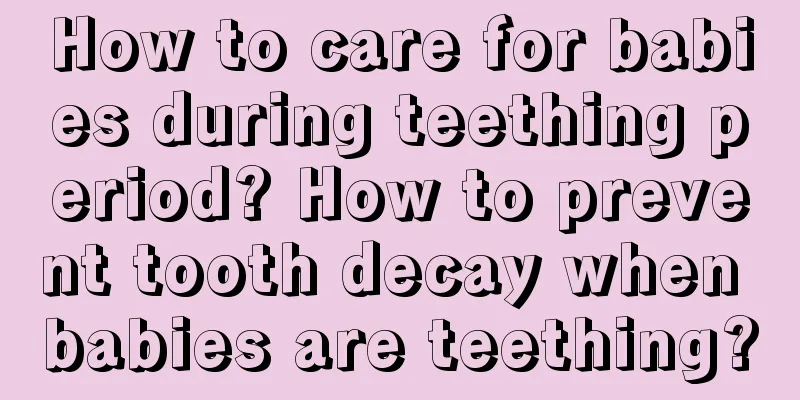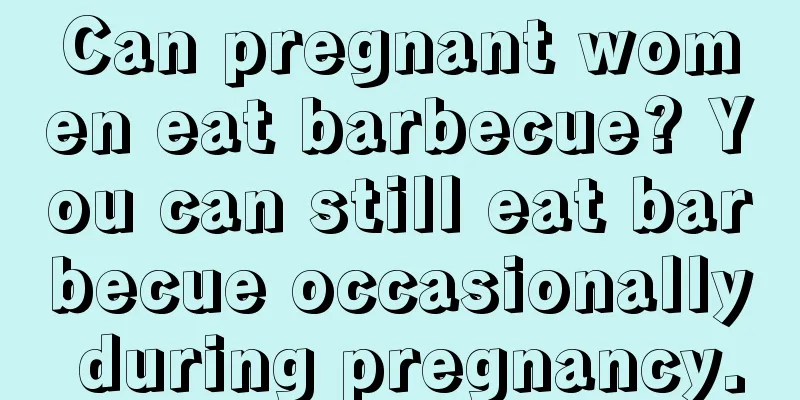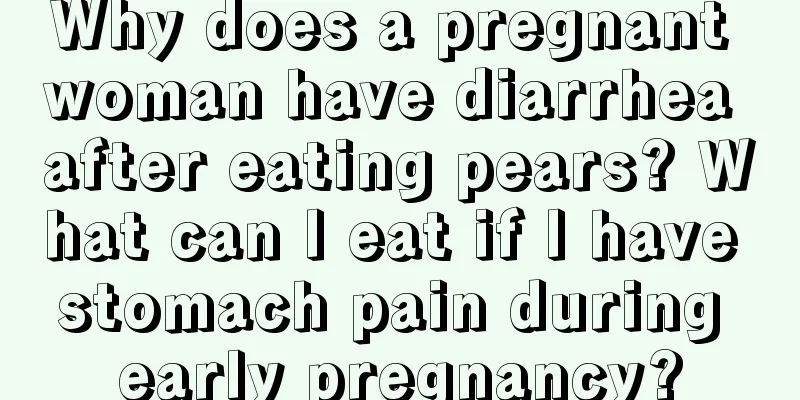How to care for babies during teething period? How to prevent tooth decay when babies are teething?

|
Ancient people often used "bright eyes and white teeth" to describe a person with good looks. It is no exaggeration to say that teeth account for 70% of a person's appearance and 80% of his temperament. Therefore, we cannot neglect the care of our baby's teeth. The following is how to take care of babies during the teething period. How to prevent tooth decay during teething? During the baby's long life, there will be two sets of teeth, 20 deciduous teeth and 32 permanent teeth. After the baby is born, the jawbone already has ossified deciduous teeth, but it has not yet erupted. Generally, it will gradually erupt when the baby is 4 to 6 months old. Teething symptoms for babies1. Drooling, drool rash, cough The phenomenon of baby drooling begins two months before the first tooth appears. When the teeth are about to sprout, the growth of small canines will stimulate the nerve endings on the gums, thereby increasing saliva secretion. The child will not swallow so much saliva, thus causing drooling. Some babies saliva a lot, which may cause the child to choke or cough. Parents can put a bib on the child to prevent the saliva from contacting the skin for too long and causing skin discomfort. 2. Biting the nipple and refusing to eat The baby will bite the nipple because of the discomfort of the baby's gums. The process of biting can relieve the baby's gums. In addition, during this process, the baby may bite the pacifier hard while drinking milk. If the pacifier is found to be damaged, it should be replaced in time. 3. Irritability, insomnia, low-grade fever, swollen and painful gums Children will be irritable due to the discomfort of teething. During the day, children's energy is distracted by various things and they will not focus on the toothache, but at night it will become very unbearable, which can easily cause the baby to have a tantrum before going to bed and wake up at night. A mild fever (low-grade fever) is more likely to occur during the teething period in babies, but this is a normal physiological reaction when the teeth pass through the oral mucosa. However, if the baby has a high fever of more than 38°, it may be caused by other diseases. When a child has discomfort, parents should not easily attribute the discomfort to teething. Instead, they should observe carefully and see a doctor in time when they are unsure whether the discomfort is really caused by teething. Relieve baby's teething discomfort1. Chewable gum and teething sticks The first choice is a teething stick. In addition, parents can also prepare a few more safe and hygienic toys for their children that are suitable for daily chewing, which will help relieve the baby's swollen and painful gums. In daily life, there are many teething biscuits specially designed for babies. When choosing, mothers must choose teething sticks made of safe materials to ensure the natural safety of food and let the baby grow healthily. When choosing auxiliary teething toys, non-toxic and safe materials should be selected. 2. What should I do if my baby bites my nipple? The baby is in the teething period, and the swelling, pain and itching of the gums make it easy for the baby to bite things. Even when the mother is feeding, the baby will choose to hold the mother's nipple and bite it to "play", which will bring a lot of discomfort to the mother. At this time, mothers can take some actions to avoid being bitten by the baby on the nipple. (1) Pay attention to your baby’s sucking movements Try to stay alert when feeding. When the baby is half full, pay attention to whether there are changes in the sucking action. If there are changes, the mother should be vigilant because this may be a signal that the baby is full and is ready to start biting the nipple to "play". (2) The feeding environment should be quiet Babies are easily attracted by the outside world. Once their attention is attracted, it may be difficult for them to concentrate on sucking milk, and they are very likely to start biting and "playing". Therefore, when mothers are breastfeeding, it is best to find a quiet and less distracted corner to breastfeed. (3) Teach with gentleness and care After the child bites the nipple, the mother can stop feeding and tell him in a serious tone: "You can't bite mom." Repeat this several times, the baby will understand and stop biting the nipple. Baby Teeth CleaningMany mothers may be curious about when to clean their baby's mouth. In fact, the baby's mouth should be cleaned before the baby's deciduous teeth erupt. When cleaning the baby's mouth, you can let the baby drink one or two sips of water to rinse his mouth. When the baby's first deciduous tooth erupts, it is not recommended for mothers to use gauze wrapped around their fingers to clean the baby's teeth at the beginning. This is because the baby's teeth are three-dimensional and it is difficult to clean the teeth completely. In addition, when parents are cleaning their children's teeth, it is not easy to control the strength, which may damage the baby's gums and is not conducive to the child forming a habit of brushing teeth. 1. Prepare a special toothbrush for your baby In some foreign countries, when a child grows his first tooth, parenting experts recommend that you use a soft-bristled toothbrush to brush the child's teeth. Before the child is two years old and has learned to spit out, there is no need to use toothpaste. So when the child has the first tooth, mothers can brush their baby's teeth. The way to brush your teeth is: brush the upper teeth from top to bottom, brush along the gaps between teeth; brush the lower teeth from bottom to top, and then carefully brush the grooves on the occlusal surface of the molars. Tips: (1) Before brushing your baby’s teeth and cleaning their mouth, parents must wash their hands under running water and pay attention to hygiene. (2) There is no absolute requirement for using toothpaste. If parents are concerned, they can brush their baby’s teeth with warm water in the early stages. When the baby learns to spit out mouthwash, they can start using fluoride toothpaste. 2. Can babies use fluoride toothpaste? According to my country's "Guidelines for Oral Health of Chinese Residents": Fluoride toothpaste is safe, can effectively prevent tooth decay, and is more suitable for children who are prone to tooth decay. Many toothpastes have fluoride content labels on them, and there is a PPM value on the toothpaste packaging. Parents can refer to the PPM value when choosing toothpaste for their babies. It is recommended that babies under 6 years old use toothpaste with a content of 500-1000ppm, and babies aged 6-12 years old use toothpaste with a content of 1000-1400ppm. Amount of toothpaste: For babies under 3 years old, it is recommended to use a rice-sized amount of toothpaste. For babies over 3 years old, use a pea-sized amount of toothpaste. Nutritional supplementation during the budding period(1) Minerals: In the human body, the main components of teeth, alveoli and jawbone are minerals such as calcium and phosphorus. Sufficient calcium is the basis for the formation of teeth. The best source of calcium in food is milk and dairy products. Soybeans, kelp, black fungus and other whole grains contain more calcium, phosphorus, iron and fluoride, which are all helpful for the calcification of baby teeth. (2) Protein: Protein plays an important role in the formation, development, calcification and eruption of teeth. If protein intake is insufficient during the tooth growth period, it will cause uneven tooth alignment, delayed tooth eruption and periodontal tissue lesions, and it is also easy to cause dental caries. There are abundant sources of protein in our daily diet, such as eggs, milk, fish, meat, cereals, beans, and dried fruits. Mothers can feed their babies more of these foods. (3) Vitamin AD: Vitamin AD is crucial for the growth of baby teeth. If you want calcium to be deposited in bones and absorbed and used by teeth to increase tooth strength, it must be "transported" by vitamin D. Otherwise, the absorption rate of calcium by the body will be less than 10%. Vitamin A can promote protein biosynthesis and bone cell differentiation, protect tooth enamel, gums and oral mucosa, prevent tooth decay, and enhance the baby's oral and physical resistance. It is a necessary foundation for healthy growth. If it is deficient, it will cause uneven teeth and even delayed tooth eruption. Prevention of dental cariesDo not let your child sleep while drinking milk (milk sleeping), whether it is a daytime nap or nighttime sleep, otherwise milk residue will remain on the teeth, which can easily lead to tooth decay in the long run. The American Dental Association and the American Academy of Pediatric Dentistry recommend that children visit the dentist for the first time after their first pair of teeth emerge, but no later than 1 year old. It is difficult for parents to judge the health of their children's teeth by themselves (for example, when parents see black spots on the surface of their children's teeth, cavities have already formed). Finally, in daily life, there are many sudden small problems, which require mothers to pay more attention in daily life. When an emergency occurs, go to the hospital to consult a doctor in time to ensure that the baby will not be delayed. In addition, after the baby starts to grow teeth, the food choices become more and more diverse. Don’t forget to adjust the diet structure for the baby appropriately and add complementary foods. |
<<: Does alum have any effect on pregnant women? What are the harms of alum to pregnant women?
>>: How many months can babies add complementary food? 4 months is the best
Recommend
Will pregnant women gain weight due to edema? How long will it take for pregnant women to recover from edema?
Many mothers will experience edema in the late st...
Can mouthwash improve periodontitis? Can mouthwash improve tooth decay?
Mouthwash does not whiten teeth. Its main functio...
Baby food supplementation order Baby food supplementation plan
When the baby grows to a certain size, complement...
How long does it take for postpartum relaxation to return to normal? What should I do if my lower body becomes loose after childbirth?
After childbirth, many mothers say that they feel...
Can I lose weight while breastfeeding? Will it affect my baby?
During the breastfeeding period, many postpartum ...
How to teach your baby to learn nursery rhymes? What excellent nursery rhymes are recommended?
Learning nursery rhymes has great benefits for th...
What should you pay attention to when you are pregnant if you have allergies?
People with allergies must pay special attention ...
What should premature babies eat to enhance their immunity? What are the symptoms of premature babies' developmental delay?
The physical constitution of premature babies is ...
What are the signs of baby's constipation?
New parents certainly don’t know that babies have...
What to do if your baby has a stuffy nose for more than one month
The baby has grown up for more than one month and...
How long after IVF egg retrieval can I have sex? How to avoid ascites after IVF egg retrieval?
IVF egg retrieval causes some trauma to the femal...
Will Vinda tissue paper clog the toilet? What are the benefits of Vinda tissue paper for the skin?
We are all familiar with Vinda tissues. Many peop...
Can pregnant women eat Dendrobium candidum? Can I eat Dendrobium candidum during breastfeeding?
Dendrobium officinale is a traditional Chinese me...
Can pregnant women eat donkey rolls? Who can't eat donkey rolls?
Donkey rolls are a kind of snack made of glutinou...
What are the symptoms before ovulation?
It is easier to get pregnant if you have sex duri...









